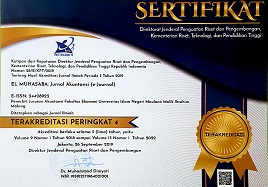Masa Jabatan CEO, Keragaman Dewan Direktur, dan Pengungkapan CSR: Eksplorasi Studi Kepustakaan
Abstract
Purpose: This study reviews various literatures and obtains an overview of the relationship between a CEO's Tenure and Boards Diversity and the quality of Corporate Social Responsibility (CSR) disclosures.
Method: The research method used in this study is a qualitative method, namely library research, by utilizing information sources derived from reputable online journals such as Scopus and Google Scholar as well as additional information obtained from articles, books, laws, and other documents relevant to the topic study.
Results: The results of studies from various sources show that the quality of CSR disclosure is strongly influenced by the tenure of the CEO and also the diversity of the board of directors. Short CEO tenure tends to increase the quality of CSR disclosure. This is because the tenure is short, the CEO will try to optimize his tenure in order to increase the credibility and ability of the CEO to lead a company. On the other hand, a working tenure that is too long can reduce the quality of CSR report disclosure. The diversity of management also has strong implications for improving the quality of CSR report disclosure. The diversity of administrators can motivate the emergence of creative and innovative ideas to disclose better CSR reports.
Implications: This research can be used as material for consideration for companies in making decisions in determining the tenure of the CEO and the diversity of the board.
Novelty: This study is the first study attempt by doing research qualitative with considering many previous studies to make some conclusions and contribute to extant literature related to the corporate mechanism by doing library research.
Keywords
Full Text:
PDFReferences
Abbott, L. J., Parker, S., & Presley, T. J. (2012). Female board presence and the likelihood of financial restatement. Accounting Horizons, 26(4), 607–629. https://doi.org/10.2308/acch-50249
ACN. (2018). Sustainability Reporting in ASEAN Countries. https://www.asean-csr-network.org/c/images/Resources/Reports/2018_Sustainability_Reporting_in_ASEAN_Countries.pdf
Adams, R. B., & Ferreira, D. (2009). Women in the boardroom and their impact on governance and performance. Journal of Financial Economics, 94(2), 291–309. https://doi.org/10.1016/j.jfineco.2008.10.007
Barker, V. L., & Mueller, G. C. (2002). CEO characteristics and firm R&D spending. Management Science, 48(6), 782–801. https://doi.org/10.1287/mnsc.48.6.782.187
Brooks, C., & Oikonomou, I. (2018). The effects of environmental, social and governance disclosures and performance on firm value: A review of the literature in accounting and finance. British Accounting Review, 50(1), 1–15. https://doi.org/10.1016/j.bar.2017.11.005
Carter, D. A., D’Souza, F., Simkins, B. J., & Simpson, W. G. (2010). The gender and ethnic diversity of US boards and board committees and firm financial performance. Corporate Governance: An International Review, 18(5), 396–414. https://doi.org/10.1111/j.1467-8683.2010.00809.x
Chang, Y. K., Oh, W. Y., Park, J. H., & Jang, M. G. (2017). Exploring the Relationship Between Board Characteristics and CSR: Empirical Evidence from Korea. Journal of Business Ethics, 140(2), 225–242. https://doi.org/10.1007/s10551-015-2651-z
Damardi, S. (2011). Board diversity and firm performance: The Indonesian evidence. Corporate Ownership and Control, 8(38721).
Erhard, N. L., Werbel, J. D., & Shrader, C. B. (2003). Board of director diversity and firm financial performance. Corporate Governance: An International Review, 11(2), 102–111. https://doi.org/10.1111/1467-8683.00011
Ferrero-Ferrero, I., Fernández-Izquierdo, M. Á., & Muñoz-Torres, M. J. (2015). Integrating Sustainability into Corporate Governance: An Empirical Study on Board Diversity. Corporate Social Responsibility and Environmental Management, 22(4), 193–207. https://doi.org/10.1002/csr.1333
Francoeur, C., Labelle, R., & Sinclair-Desgagné, B. (2008). Gender diversity in corporate governance and top management. Journal of Business Ethics, 81(1), 83–95. https://doi.org/10.1007/s10551-007-9482-5
Giannetti, M., & Zhao, M. (2019). Board ancestral diversity and firm-performance volatility. Journal of Financial and Quantitative Analysis, 54(3), 1117–1155. https://doi.org/10.1017/S0022109018001035
Gulzar, M. A., Cherian, J., Hwang, J., Jiang, Y., & Sial, M. S. (2019). The impact of board gender diversity and foreign institutional investors on the corporate social responsibility (CSR) engagement of Chinese listed companies. Sustainability (Switzerland), 11(2), 1–19. https://doi.org/10.3390/su11020307
Hambrick, D. C., & Mason, P. A. (1984). Upper Echelons: The Organization as a Reflection of Its Top Managers. Academy of Management Review, 9(2), 193–206. https://doi.org/10.5465/amr.1984.4277628
Henderson, A. D., Miller, D., & Hambrick, D. C. (2006). How quickly do CEOs become obsolete? Industry dynamism, CEO tenure, and company performance. Strategic Management Journal, 27(5), 447–460. https://doi.org/10.1002/smj.524
Hoang, T. C., Abeysekera, I., & Ma, S. (2018). Board Diversity and Corporate Social Disclosure: Evidence from Vietnam. Journal of Business Ethics, 151(3), 833–852. https://doi.org/10.1007/s10551-016-3260-1
Huafang, X., & Jianguo, Y. (2007). Ownership structure, board composition and corporate voluntary disclosure: Evidence from listed companies in China. Managerial Auditing Journal, 22(6), 604–619. https://doi.org/10.1108/02686900710759406
Huang, S., & Hilary, G. (2018). Zombie Board: Board Tenure and Firm Performance. Journal of Accounting Research, 56(4), 1285–1329. https://doi.org/10.1111/1475-679X.12209
Huse, M., Nielsen, S. T., & Hagen, I. M. (2009). Women and employee-elected board members, and their contributions to board control tasks. Journal of Business Ethics, 89(4), 581–597. https://doi.org/10.1007/s10551-008-0018-4
Jaakkola, E. (2020). Designing conceptual articles: four approaches. AMS Review, 10(1–2), 18–26. https://doi.org/10.1007/s13162-020-00161-0
Ji, J., Peng, H., Sun, H., & Xu, H. (2021). Board tenure diversity, culture and firm risk: Cross-country evidence. Journal of International Financial Markets, Institutions and Money, 70, 101276. https://doi.org/10.1016/j.intfin.2020.101276
Katmon, N., Mohamad, Z. Z., Norwani, N. M., & Farooque, O. Al. (2019). Comprehensive Board Diversity and Quality of Corporate Social Responsibility Disclosure: Evidence from an Emerging Market. Journal of Business Ethics, 157(2), 447–481. https://doi.org/10.1007/s10551-017-3672-6
Lewis, B. W., Walls, J. L., & Dowell, G. W. S. (2014). Difference in degrees: CEO characteristics and firm environmental disclosure. Strategic Management Journal, 35(5), 712–722. https://doi.org/10.1002/smj.2127
Li, Na and Wahid, A. S. (2016). Director Tenure Diversity and Board Monitoring Effectiveness. International Journal of Laboratory Hematology, 38(1), 42–49. https://doi.org/10.1111/ijlh.12426
Li, N., & Wahid, A. S. (2018). Director Tenure Diversity and Board Monitoring Effectiveness. Contemporary Accounting Research, 35(3), 1363–1394. https://doi.org/10.1111/1911-3846.12332
Luo, X., Kanuri, V. K., & Andrews, M. (2014). How does CEO tenure matter? the mediating role of firm-employee and firm-customer relationships. Strategic Management Journal, 35(4), 492–511. https://doi.org/10.1002/smj.2112
McCarthy, S., Oliver, B., & Song, S. (2017). Corporate social responsibility and CEO confidence. Journal of Banking and Finance, 75, 280–291. https://doi.org/10.1016/j.jbankfin.2016.11.024
Nguyen, T. L. H., Tran, N. M., & Vu, M. C. (2021). The influence of board characteristics and state holding on corporate social responsibility disclosure, evidence from vietnamese listed firms. Business: Theory and Practice, 22(1), 190–201. https://doi.org/10.3846/btp.2021.13490
Oh, W. Y., Chang, Y. K., & Cheng, Z. (2016). When CEO Career Horizon Problems Matter for Corporate Social Responsibility: The Moderating Roles of Industry-Level Discretion and Blockholder Ownership. Journal of Business Ethics, 133(2), 279–291. https://doi.org/10.1007/s10551-014-2397-z
Oh, W. Y., Chang, Y. K., & Jung, R. (2018). Experience-based human capital or fixed paradigm problem? CEO tenure, contextual influences, and corporate social (ir)responsibility. Journal of Business Research, 90(May), 325–333. https://doi.org/10.1016/j.jbusres.2018.05.034
Rodriguez-Fernandez, M., Fernandez-Alonso, S., & Rodriguez-Rodriguez, J. (2014). Board characteristics and firm performance in Spain. Corporate Governance (Bingley), 14(4), 485–503. https://doi.org/10.1108/CG-01-2013-0013
Souder, D., Simsek, Z., & Johnson, S. G. (2012). The Differing Effects of Agent and Founder CEOs On The Firm’s Market Expansion. Strategic Management Journal, 41(May 2011), 23–41. https://doi.org/10.1002/smj
Subramanian, A. M., Choi, Y. R., Lee, S. H., & Hang, C. C. (2016). Linking technological and educational level diversities to innovation performance. Journal of Technology Transfer, 41(2), 182–204. https://doi.org/10.1007/s10961-015-9413-z
Thomas, A. S., & Simerly, R. L. (1994). The Chief Executive Officer and corporate social performance: An interdisciplinary examination. Journal of Business Ethics, 13(12), 959–968. https://doi.org/10.1007/BF00881665
Tran, N. M., & Pham, B. N. T. (2020). The influence of CEO Characteristics on corporate environmental performance of SMEs: Evidence from Vietnamese SMEs. Management Science Letters, 10(8), 1671–1682. https://doi.org/10.5267/j.msl.2020.1.013
Wu, S., Levitas, E., & Priem, R. L. (2005). CEO tenure and company invention under differing levels of technological dynamism. Academy of Management Journal, 48(5), 859–873. https://doi.org/10.5465/amj.2005.18803927
Zhang, J. Q., Zhu, H., & Ding, H. bin. (2013). Board Composition and Corporate Social Responsibility: An Empirical Investigation in the Post Sarbanes-Oxley Era. Journal of Business Ethics, 114(3), 381–392. https://doi.org/10.1007/s10551-012-1352-0
Zhu, J., Ye, K., Tucker, J. W., & Chan, K. (Johnny) C. (2016). Board hierarchy, independent directors, and firm value: Evidence from China. Journal of Corporate Finance, 41, 262–279. https://doi.org/10.1016/j.jcorpfin.2016.09.009
DOI: https://doi.org/10.18860/em.v14i1.17416
Refbacks
- There are currently no refbacks.
Editorial Office:
Megawati Soekarnoputri Building
Accounting Department, Faculty of Economics
Jln. Gajayana 50 Telp (0341) 558881
E-mail: elmuhasaba@uin-malang.ac.id
Universitas Islam Negeri Maulana Malik Ibrahim Malang
E-ISSN 2442-8922
P-ISSN 2086-1249

This work is licensed under a CC BY SA 4.0 International License

















